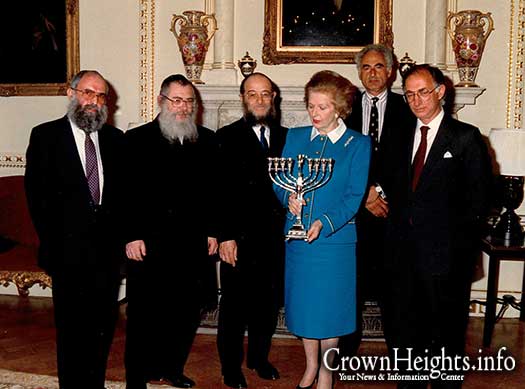
Thatcher Recalled With Respect and ‘Great Pride’
The anecdotes proved plentiful, respectful and admirable. Chabad-Lubavitch representatives called to mind the wise and witty former British Prime Minister Margaret Thatcher and her various one-on-one encounters with them.
Thatcher died Monday at the age of 87, leaving behind a powerful legacy of leadership. The first female in the role, she held the title of prime minister from 1970 until 1990, presiding over the Falklands war in 1982 and serving three terms in office until her resignation in 1990.
Rabbi Aron Dov Sufrin, director of education of Lubavitch schools in London for more than 40 years and a member of the Hanholas Beis Lubavitch, London, was a great admirer of Thatcher’s, according to his son, Rabbi Aryeh Sufrin. “I recall my father referring to Mrs. Thatcher with great pride,” he said. “He saw her strengths as a determined woman who knew what was best for education for the United Kingdom.”
The elder Sufrin corresponded with Thatcher as he developed the school’s education program and pursued state aid, said his son. He also organized a visit by Thatcher to the Lubavitch school system back in 1972; she came to attend a presentation prepared by students about the journey of the Jewish people from Egypt to Israel.
Upon receiving a detailed report of her visit, the Lubavitcher Rebbe — Rabbi Menachem M. Schneerson, of righteous memory — focused on a story of Thatcher watching a slideshow made by the top class in the girls’ high school, an automatic 20-slide presentation on a day in the life of Jewish girl.
After seeing how they got dressed, making sure their elbows and knees were fully covered, Thatcher, who had come in a sleeveless dress, very discreetly sent her assistant down to the car to get her jacket.
She wore that jacket until the end of her visit, recalled Rabbi Shmuel Lew, principal of the Lubavitch senior girls’ school and head of education of Chabad U.K. He was a student chaplain at the time, and she the Minister of Education. The Rebbe pointed out that she respected, was sensitive to and learned from what she saw, added Lew.
“Although she was very controversial, many people came to respect her for standing up for her principles,” continued Lew. The country changed drastically under Thatcher’s leadership, he said, and “she had a profound effect on the English economy.”
Thatcher went on to become head of the Conservative party in 1975, then to win the election in 1979.
Later in life, Thatcher wrote in her memoir that despite decades in politics where she impacted millions, the “proudest moment” in her life was as a 12-year old girl who helped to save the life of a Jewish girl in Nazi Austria.
In 1938, 17-year-old Edith Muhlbauer wrote to her pen pal, Thatcher’s sister Muriel Roberts, asking if the Roberts family might help her escape Austria. The Nazis had begun rounding up the first of Vienna’s Jews, and Edith and her family worried she might be next.
Thatcher’s father, Alfred Roberts, was a small-town grocer who had neither the time nor the money to take Edith in. So Margaret, then 12, and Muriel, 17, raised funds and persuaded the local Rotary club to help.
Had the Roberts family not intervened, Edith recalled years later: “I would have stayed in Vienna, and they would have killed me.” Thatcher never forgot the lesson:“Never hesitate to do whatever you can, for you may save a life.”
In July of 1989, Chabad presented her with a menorah. In preparation for the meeting, she had been advised that under traditional Jewish law and custom, men and women do not shake hands. The story goes, said Lew, that she walked into the room, put her hands behind her back and greeted them with a small bow.
“She was a very correct person, a very nice person, but very tough,” he observed. “When she saw something was right, she saw she had to see it through.”
A picture of Thatcher and the menorah — flanked by Rabbi Aron Dov Sufrin and several others — hung on the elder Sufrin’s wall until his death in 1997. Passed on to his son, it now hangs in the Chabad House office.
She fought for her agenda, and was determined to fulfill the responsibilities given to her by the electorate, said the younger Sufrin. “She admired Lubavitch, the Rebbe, and the contributions that the Jewish community were making to Great Britain.”












